It wouldn’t be a stretch to say that our smartphones are like new limbs attached to our bodies. We use them as soon as we wake up and keep them to our side until we retire for the day. From the apps we have to the photos and memos we keep in it, it reflects what’s important in our daily routines. But while it is unavoidable to have this kind of relationship with our smartphones nowadays, are we aware of how much time we’re spending on it?
A couple of months ago, I tracked my own screen time for a week out of curiosity. It led to a lot of interesting conclusions. Some of them I was already aware of (like the apps I spend the most time on and how many notifications I usually get in a day) and others, led to a satisfactory realisation about my screen time numbers (that it’s much lower than the general average based on statistics). This time, I asked others to take a peek at their screen times to see what kind of reactions and reflections they would have with their discoveries. Below are their thoughts.
From their first phone to smartphone
Before we discussed their current relationships with their smartphones, we looked back at their first experience with handheld phones. This was to see how much things have changed for them since then, considering how digital advancements have taken a significant leap in the last two decades.
Senior high school student Ara, 17, had a Samsung GT-S in Neon Pink as her first phone. She said that she mostly used it for listening to music and contacting her parents.
“It’s so different from my current phone which has a lot of features and apps. [Compared to before], my procrastination habit is most significantly affected by this change,” she said.
Business planning analyst Katreena, 23, on the other hand, couldn’t exactly remember her first phone. But she was sure it was a Nokia and that she had it in 2004.

Do you still remember your first phone? (Photo from: Eirik Solheim)
“Back then, I mainly used it to play pre-installed games and to contact my parents whenever I needed to. My relationship with my phone has significantly changed as I rarely play games on my phone anymore and I mainly use mine now for social media purposes.”
For creative director and illustrator Valeri, 26, and content creator Cindy, it was the iconic Nokia 3310. Valeri even fondly shared that his phone had a Pokemon Chansey case.
“My relationship with phones is like a rollercoaster ride, especially when social media just started,” shared Valeri. “I remembered when Instagram was new and it was only available on iPhone and I was still using Blackberry. I felt FOMO (fear of missing out) that I ended up getting an iPhone.”
For Cindy, going anywhere without her phone nowadays is quite impossible.
“My phone’s with me 24/7. Even when I’m sleeping, my phone is just right beside me so I think that shows how dependent I am on my phone compared to 20 years ago.”
Guessing their screen time duration
“Maybe around eight to nine hours?” said Ara. “I’m on Twitter, Messenger, and Instagram both day and night.”
Ara confessed that she can only put down her phone when she’s sleeping or doing something for school. This is because her attention span is short and she’s always in need of a good distraction.
Meanwhile, Katreena said: “To be honest, I wouldn't be surprised if my screentime exceeded 12 hours daily as I have it on most of the time especially given I'm currently working from home. I check Twitter the first thing in the morning and I'm usually on the same app before I fall asleep at night.”
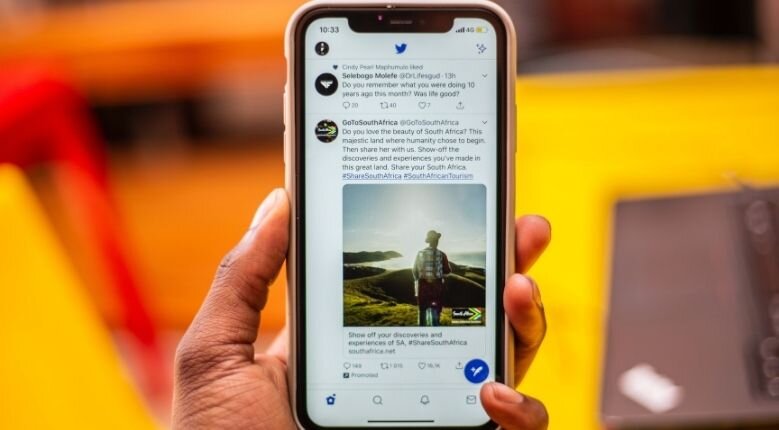
Would their guesses be the same as their actual results? (Photo from: Daddy Mohlala via Unsplash)
“The last app I open before I sleep is always Twitter because I need to retweet some of my tweets to keep the momentum going. I need to do that for my income,” he said. He added that he has some friends abroad and he can only connect with them during certain hours.
Cindy, meanwhile, shared that her guess is only two hours a day on average. She still finds it excessive, sharing that she believes she is highly dependent on her phone. It doesn’t help that she’s now engrossed with Clubhouse.
Revealing the results
“It was 11 hours last week,” Ara exclaimed. “It increased compared to my usual and expected screen time.”
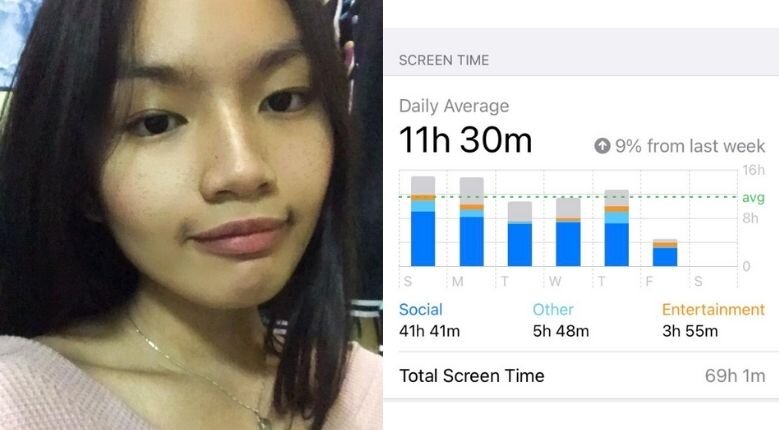
Ara's screen time results
Ara was partially surprised with the increase in her expected results. (Photo from: GIPHY)
Her smartphone played an even bigger role in keeping her occupied, as well as keeping and establishing relationships online amidst the pandemic, she said. She was surprised that according to her results, Discord — another digital communication app composed of various servers — was another app she frequents.
Katreena, on the other hand, was quite pleased with her results.
“My screentime is below 11 hours a day, which is less than my guess,” she said.
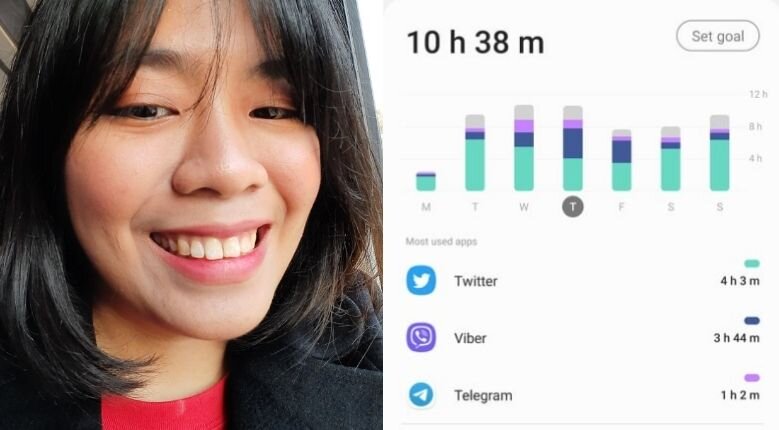
Katreena's screen time results
Katreena found it interesting that an app she never thought she spend much time on was one of her top apps overall. (Photo from: GIPHY)
She wasn’t surprised that Twitter was her most used app but felt quite the opposite about Viber taking second place.
“Viber is the messaging app we use for work. I don't really like opening Viber so I was surprised at how much I was using it,” said Katreena.
Reflecting on her results, Katreena shared that she thinks she can only last “two to three hours tops” without using her phone because she always has to be in the know of what’s what and her phone is the main source for that.
“OMG! My daily screen time is eight hours and 25 minutes. This is kind of a shock,” said Valeri, whose guess was way above the actual results. “It says Instagram is in second place. I feel Twitter should be there, but because I open Twitter on my computer more, maybe that’s why.”
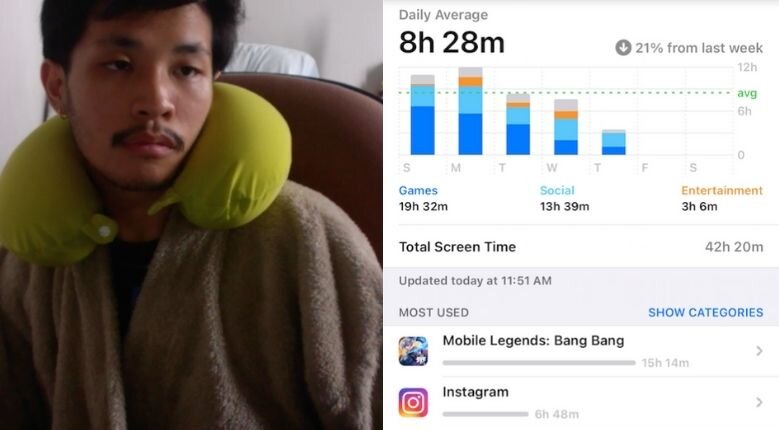
Valeri's screen time results
Valeri was quite shocked that his results were significantly lower than what he initially guessed. (Photo from: GIPHY)
Cindy’s guess was on point. Clubhouse is at the top of her list as she expected, with the rest of the apps appearing on her most-used apps too.
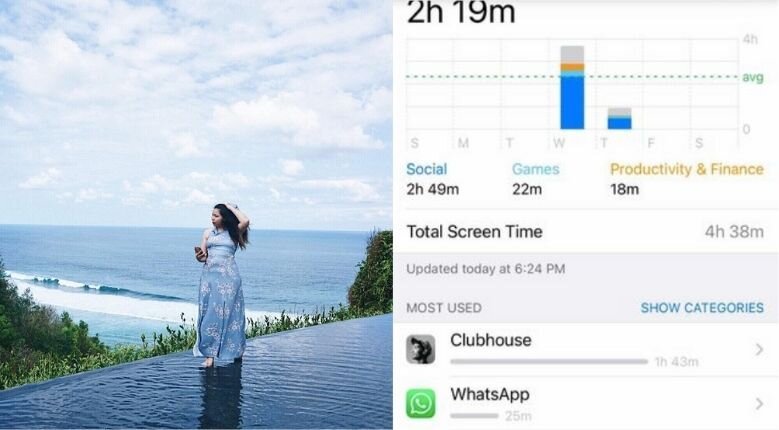
Cindy's screen time results
Cindy was quite happy that her results were at par with her initial guess. (Photo from: GIPHY)
She revealed, “I mute all my notifications for other socials because I don’t want to keep checking on them all the time. The only exception is WhatsApp, so if there’s something that pops there, then I have to check it first.”
She was, however, aware that she might be getting too into Clubhouse lately, which is something she has to keep an eye on. She figured that it might just be a phase since Clubhouse is the new ‘it’ thing and that it requires you to engage in conversations, unlike Facebook or Instagram, which makes it addicting.
Realisations and thoughts on digital dependency
Ara admitted that she might be “staring too much at the screen” lately and need to give her eyes a rest. However, with online classes and keeping up with her online social life, it’s not that easy to commit to. She also shared that through the internet, she’s able to express herself more and find more people who share similar interests, which is why putting her phone down is hard. With this, Ara concluded that she recognises the need to slow down but she’s fine with her current screen time.
Looking at the digital dependency beyond her realisations, Ara said: “It is relevant, especially during the pandemic. Digital dependency is needed to keep industries going such as work, education, entertainment, and many more.”
Cindy shared similar thoughts, saying that if the pandemic happened in previous decades when phones weren’t as reliable now, there would be an “economic collapse.” She believes that industries nowadays are only able to keep afloat because of the advancement in technology. Labels such as ‘content creators’ would also not exist because information sharing would be so much different.

Your digital dependency is still, ultimately, up to you. (Photo from: Nathana Rebouças via Unsplash)
“There are people out there who experience negative experiences brought by over-usage of their phones. However, I don't think phones or gadgets are necessarily bad or good things on their own,” Katreena said.
There are certain opportunities and information from other countries that she wouldn’t be able to access if it weren’t for the internet. So while there is a need for awareness regarding the pros and cons of digital dependency, it is still up to the user to moderate themselves.
“Knowing your screentime and how long it consumes your day makes you feel like you're spending your time on something that is not necessarily for personal development,” she said. “It made me think that I should pick up on some of my old hobbies like reading books to learn some other things.”
Valeri agreed to say that while he’s quite pleased with his results, especially with the knowledge that the time spent was mostly work-related, he could do a lot better.
“I shocked myself when I saw that the results are much lower. But I will keep my screen time at least the same,” Valeri said. “ If I can lower the screentime even more, then that’s much better. That way, I feel like I can live my life to the fullest more often.”
Just like Ara, Katreena, Valeri, and Cindy, there are some things still left to learn and realise from our digital dependence. Smartphones and the internet are a necessity now. However, while we need them, we also need to monitor our relationship with them. Are our phones tools for us to live life or are we living through the confines of their four glassed corners? Whatever we do with our discoveries are still up to us, of course, but they do put things into perspective.
Comments, questions or feedback? Email us at [email protected].



